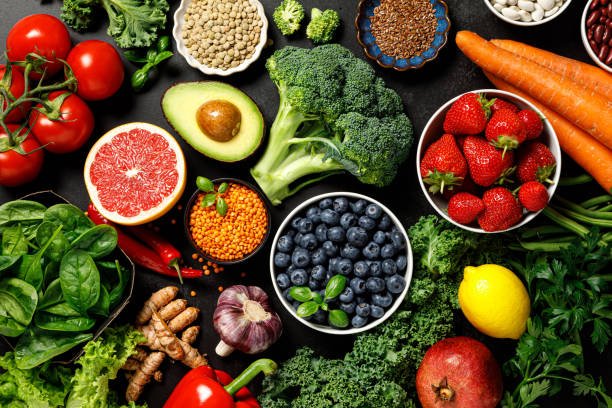Vegetables and Fruits
As omnivores with diverse dietary needs, dogs benefit significantly from the inclusion of vegetables and fruits in their meals. Beyond the conventional dog food, integrating these plant-based components into a dog’s diet can provide a spectrum of essential vitamins, minerals, fiber, and antioxidants. In this exploration, we delve into the nutritional advantages of vegetables and fruits for dogs, the variety of options available, and considerations for incorporating these natural offerings into a canine’s nutrition plan.
Nutritional Advantages of Vegetables and Fruits
1. Vitamins and Minerals
Vegetables and fruits are rich sources of vitamins and minerals that contribute to a dog’s overall health. Vitamin A, found in vegetables like carrots and sweet potatoes, supports vision and immune function. Vitamin C, abundant in fruits such as berries and citrus, acts as an antioxidant and aids in collagen production. Meanwhile, minerals like potassium, present in bananas, help regulate fluid balance and support muscle function.
2. Fiber for Digestive Health
The fiber content in vegetables and fruits promotes digestive health in dogs. Fiber aids in maintaining regular bowel movements, preventing constipation, and supporting a healthy gut microbiome. Vegetables like pumpkin and sweet potatoes, as well as fruits such as apples and pears (minus seeds and cores), are excellent sources of dietary fiber.
3. Antioxidants for Immune Support
Antioxidants, abundant in many fruits and vegetables, play a crucial role in neutralizing free radicals and supporting the immune system. Berries, spinach, and broccoli are examples of antioxidant-rich options that contribute to a dog’s overall well-being and may help prevent cellular damage.
4. Hydration and Electrolytes
Certain fruits, such as watermelon and cucumber, have high water content, contributing to hydration. Additionally, they provide electrolytes like potassium, aiding in maintaining proper fluid balance and supporting various physiological functions.
Diverse Vegetable Options for Dogs
1. Carrots:
- Carrots are a crunchy and nutritious vegetable rich in beta-carotene, which converts to vitamin A. They make excellent natural treats and contribute to dental health by promoting chewing.
2. Sweet Potatoes:
- Sweet potatoes are a versatile and nutrient-dense option, providing vitamins, minerals, and fiber. They can be cooked and added to meals or served as dehydrated treats.
3. Pumpkin:
- Pumpkin is a fiber-packed vegetable that supports digestive health. Canned, pureed pumpkin (without added sugars or spices) can be incorporated into meals to aid in digestion and alleviate constipation.
4. Broccoli:
- Broccoli is a cruciferous vegetable rich in vitamins C and K. It can be steamed or lightly cooked and added to a dog’s food in moderation, providing a boost of nutrients.
5. Spinach:
- Spinach is a leafy green that offers vitamins A, B, and K. It can be finely chopped and added to a dog’s meal, providing a nutrient boost. However, oxalates in spinach should be considered, and it should be fed in moderation.
Varied Fruit Options for Dogs
1. Apples:
- Apples are a crunchy and hydrating fruit that also provides fiber. Remove seeds and cores before offering slices as a healthy snack.
2. Berries (Blueberries, Strawberries):
- Berries are rich in antioxidants and can be served as a tasty and nutritious treat. Blueberries and strawberries are particularly popular choices.
3. Bananas:
- Bananas are a potassium-rich fruit that dogs often find palatable. They can be sliced and offered as a treat or mashed and mixed with other foods.
4. Watermelon:
- Watermelon, with its high water content, can be a refreshing and hydrating option in moderation. Ensure that seeds and rinds are removed before serving.
5. Pineapple:
- Pineapple is a tropical fruit that offers vitamins and digestive enzymes. It can be served in small, bite-sized pieces as an occasional treat.
Considerations for Incorporating Vegetables and Fruits
1. Moderation is Key:
- While vegetables and fruits offer numerous benefits, moderation is crucial. Excessive amounts can lead to digestive upset or contribute to an imbalance in a dog’s diet.
2. Avoid Harmful Foods:
- Certain fruits, such as grapes and raisins, as well as some vegetables like onions and garlic, can be toxic to dogs and should be avoided. Always research and ensure that the chosen fruits and vegetables are safe for canine consumption.
3. Food Allergies and Sensitivities:
- Some dogs may have allergies or sensitivities to specific fruits or vegetables. Introduce new foods gradually, monitor for any adverse reactions, and consult with a veterinarian if concerns arise.
4. Preparation Methods:
- Proper preparation is essential. Remove seeds, pits, and cores, and avoid seasoning or adding harmful ingredients. Cooking certain vegetables may enhance digestibility.
5. Consultation with a Veterinarian:
- Before making significant changes to a dog’s diet, including the introduction of new fruits and vegetables, consult with a veterinarian. They can provide guidance based on the dog’s individual needs, health status, and dietary requirements.
Conclusion
In the vibrant tapestry of canine nutrition, vegetables and fruits weave a thread of essential nutrients, flavors, and health benefits. The incorporation of these natural offerings into a dog’s diet can enhance overall well-being, supporting everything from digestive health to immune function.
From the crisp crunch of carrots to the juicy sweetness of berries, the world of vegetables and fruits offers a diverse array of options for pet owners to explore. With careful consideration, moderation, and a watchful eye on potential sensitivities, dogs can enjoy the bounty of nature’s goodness, enriching their diets and contributing to a life filled with vitality and health. As stewards of our furry companions, let us embrace the nutritional richness that vegetables and fruits bring to the canine table, ensuring that our dogs thrive on the wholesome goodness of nature’s harvest.

